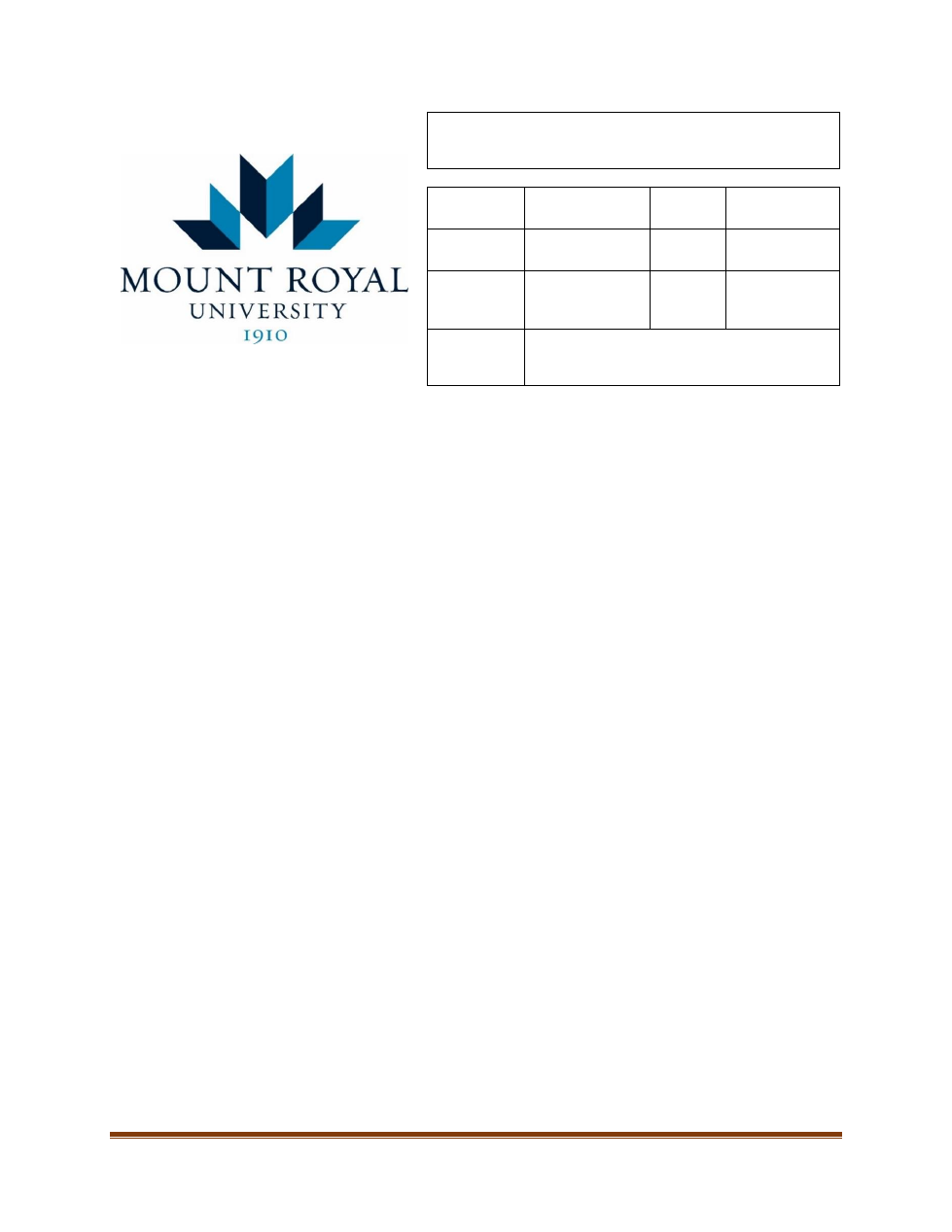
Ethics of Research Involving Human Participants Procedures
– May 28, 2024
Page 1 of 10
PROCEDURES FOR ETHICS OF RESEARCH
INVOLVING HUMAN PARTICIPANTS
Procedure
Type:
Management
Initially
Approved:
May 10, 2012
Procedure
Sponsor:
Provost and VP,
Academic
Last
Revised:
May 28, 2024
Administrative
Responsibility:
AVP, Research,
Scholarship and
Community
Engagement
Review
Scheduled:
May 28, 2029
Approver:
Executive Leadership Team
A.
PROCEDURES
1. RESPONSIBILITY OF RESEARCHERS AND SCHOLARS
A researcher who plans to conduct Research Involving Human Participants is required to:
1.1.
Be familiar with all University policies related to research, including without limitation the
University Ethics of Research Involving Human Participants Policy, the most current version
of the Tri-Council Policy Statement (TCPS 2): Ethical Conduct for Research Involving
Humans, and all related University research policies and procedures.
1.2.
Bring to the attention of the Chair
of such researcher’s department, or where the researcher
is in a non
‐departmentalized faculty, the Dean or the Dean’s designate, any research project
proposed by the researcher, or proposed by a student working under the direction of the
researcher through submission to the Office of Research, Scholarship and Community
Engagement research management system.
1.3.
Submit an application for ethics review and approval using the current form specified by the
HREB for each project relevant to this Policy prior to conducting the research or accessing
the data of Human Participants, and include in the application sufficient details required by
HREB in order to discharge its duties as set out in Section 2 of the Ethics of Research
Involving Human Participants Policy.
1.4.
Consult HREB to obtain a determination as to whether a research project requires research
ethics review prior to engaging in any research activities should there be any doubt as to
whether a research project constitutes Research Involving Human Participants requiring
ethics review.
1.5.
Conflicts of interest (COIs) involving the researcher(s) must be declared to and be managed
by HREB as part of its review. These COIs must be declared as specified in the Procedure
for Conflict of Interest in Research in order to satisfy federal policies on the Responsible
Conduct of Research.
1.6.
Promptly inform HREB of any similar or equivalent proposal to research ethics boards or
similar bodies at other institutions, and to funding agencies or regulatory bodies. HREB shall
determine if concurrent applications are acceptable.
1.7.
Adhere to the submitted protocol as approved.
1.8.
Ensure that all researchers involved in the project are aware of and comply with this Policy,
as well as all other relevant policies of the University.

Ethics of Research Involving Human Participants Procedures
– May 28, 2024
Page 2 of 10
1.9.
Maintain any issued Letter of Clearance in good standing throughout the life cycle of the
research project (TCPS 2, Article 6.1.4).
1.10. Ensure that any modifications to the study personnel, funding, protocol, consent form or any
recruitment procedures are cleared by the HREB prior to implementation, except where
necessary to eliminate apparent immediate hazards to participants.
1.11. Report all serious and unexpected study related events to the HREB in accordance with
applicable regulations and guidelines.
1.12. Promptly notify HREB when the study concludes or request an extension (normally of one
year) if the Letter of Clearance expires.
1.13. Submit a Completion Report by the expiry date stated on the Letter of Clearance, if an
extension is not requested and the research is complete.
2. COMPOSITION OF HREB
2.1.
The Board of Governors of Mount Royal University delegates to the Provost and Vice-
President Academic (VPA) responsibility for membership and implementation of HREB.
2.2.
The Chair of the HREB is a faculty member appointed by the Provost and Vice-President
Academic, normally for a period of up to three years. At the expiry of the initial three-year
term, the appointment may be renewed for an additional term, normally for a period of up to
three years, with the agreement of the HREB Chair and at the discretion of the Provost and
Vice-President Academic.
2.3.
Members of HREB will be appointed by the Provost and Vice-President Academic in
consultation with the HREB Chair. Normally appointments will be for a three-year term, with
the possibility of renewal for a further three-year term. Terms of individual appointments
should be staggered in order to ensure continuity of expertise.
2.4.
The Provost and Vice-President Academic, in consultation with the HREB Chair, will appoint
a Vice-Chair, for a period of up to three years. The HREB Vice-chair will chair the meetings
and make decisions in the absence of the HREB Chair.
2.5.
HREB will consist of at least eight (8) core members, in addition to the Chair, composed of
a diverse group of people, with:
2.5.1. members selected for representation and methodological and research expertise
in the disciplines, fields and methodologies (including Indigenous and non-
Western approaches) covered by the HREB. Expertise is the guiding principle for
member selection, but the HREB will also strive to achieve broad representation
across the University's faculties.
2.5.2. one member knowledgeable in research ethics.
2.5.3. one community member with no affiliation to the University.
2.5.4. one student member of the University.
2.6.
The majority of the above members should have both the training and the expertise to make
sound judgements on the ethics of research proposals involving human participants.
2.7.
Additional members may be appointed by the Provost and Vice-President Academic,
including but not limited to:
2.7.1. a member knowledgeable in the relevant law that is not the legal counsel of the
University.
2.7.2. additional community members in keeping with the overall size of the Board.

Ethics of Research Involving Human Participants Procedures
– May 28, 2024
Page 3 of 10
2.7.3. ad hoc members appointed for special purpose reviews, who will not be part of the
decision.
2.7.4. substitute members to serve as replacements for regular members when they are
unable to attend meetings.
3. HREB CHAIR
3.1.
The Chair of HREB is responsible for ensuring that the research ethics review process
adhered to by HREB conforms to the requirements of the Tri
‐Council Core Ethical Principles
and all other relevant requirements, laws, regulations, policies, standards and guidelines
that are relevant to research ethics review.
3.2.
The role of the Chair is to:
3.2.1. provide leadership for HREB.
3.2.2. facilitate the research ethics review process, based on University policies and
procedures and the most current version of the Tri
‐Council Policy Statement:
Ethical Conduct for Research Involving Humans.
3.2.3. oversee decisions of the HREB for consistency.
3.2.4. ensure that HREB decisions are recorded accurately and communicated clearly to
researchers in writing as soon as possible by the Chair or their designate.
3.2.5. ensure appropriate quorum requirements are met for each Research project being
reviewed.
4. RESPONSIBILITIES OF HREB
4.1.
The HREB shall:
4.1.1. Determine if it is the appropriate body to review the application and whether the
application is within its jurisdiction or expertise.
4.1.2. Consider methodological aspects of the research as necessary to assess the risks
and benefits.
4.1.3. Determine whether proposals are acceptable on ethical grounds.
4.1.4. Determine the level and frequency of continuing review of the research appropriate
to the degree of risk, provided it is not less than once per year.
4.1.5. Determine that free and informed consent will be obtained and maintained.
4.1.6. Determine if the research is compliant with the
University’s Policy on Ethics of
Research Involving Human Participants, the current TCPS and other relevant
standards.
4.1.7. Follow the current TCPS guidelines regarding intensity and nature of review
(Article 6.12), multi-jurisdictional research (Chapter 8), and delegated review
(Article 6.12).
4.1.8.
Refer any significant issues of research integrity, risk management, or other risk
declarations identified during the course of review, and not covered under this
Policy, to the appropriate institutional authority for review, as discussed in the
Responsible Conduct in Research Policy, Code of Conduct Employees Policy,
Student Code of Academic Integrity Policy, Enterprise Risk Management Policy,

Ethics of Research Involving Human Participants Procedures
– May 28, 2024
Page 4 of 10
or any other relevant policies. If the issues are not relevant to the Ethics of
Research Involving Human Participants Policy, HREB shall not delay review on
their account.
4.2.
In discharging their responsibilities described in the Ethics of Research Involving Human
Participants Policy, HREB shall:
4.2.1. normally host monthly meetings during the academic year. Other meetings may
be called by the Chair as necessary.
4.2.2. normally, HREB meetings shall be face-to-face, though where circumstances
require it, alternate communication mediums may be utilized.
4.2.3. achieve quorum for protocol decisions (i.e., clearance, sanctions, and related
matters) with at least five (5) members, including a diverse group of people, of
whom:
i.
two members have broad expertise in the methods or areas of research
under review;
ii. one member is knowledgeable in ethics; and
iii. one member has no affiliation with the institution and is recruited from the
community served by the University.
4.2.4. It is preferred that HREB decisions are made by consensus. Where consensus is
not achieved the decision shall be made by majority vote.
4.2.5. Members of HREB must act with integrity and adhere to the highest ethical
standard at all times. If HREB is reviewing research in which a member of HREB
has a personal interest (e.g., as a researcher or as an entrepreneur), conflict of
interest principles require that the member not be present when HREB is
discussing or making its decision.
4.2.6. In order to preserve the independent decision-making capacity of HREB,
University administration at the level of Associate or Vice Dean/Director or above
shall not be members of HREB, nor attend meetings other than as an invited guest
or applicant.
4.3.
HREB may terminate ethics clearance:
4.3.1. where there is clear evidence that it is not being conducted in accordance with its
requirements; or
4.3.2. that is associated with unexpected harm to participants.
4.4.
HREB shall specify a process for continuing review of approved projects in consultation with
the researcher.
4.4.1. In accordance with the principle of proportionate review, research that poses at
most Minimal Risk to participants will require only a minimal process, normally
consisting of an annual report.
4.4.2. HREB may require researchers conducting projects that are deemed greater than
Minimal Risk to submit to additional review elements such as random audit of the
consent process, review of documents, or establishment of a safety monitoring
committee and report on a shorter time frame.
4.4.3. In cases where researchers depart from the approved research, HREB shall
specify appropriate review procedures or actions, to be carried out by the
appropriate institutional authority and coordinated by the Office of Research,

Ethics of Research Involving Human Participants Procedures
– May 28, 2024
Page 5 of 10
Scholarship and Community Engagement (ORSCE). The HREB shall be promptly
notified of the results of any such review process by the ORSCE.
5. REVIEW OF UNDERGRADUATE RESEARCH
5.1.
The University encourages undergraduate student involvement in Research Involving
Human Participants. These activities are subject to the same review requirements as faculty
research, but may be delegated to non-HREB members at the department, Faculty, or
equivalent level (TCPS 2, Article 6.12). The HREB has a responsibility to ensure that
delegated reviewers have the appropriate expertise, training, and resources required, and
special attention should be given to the assessment of real, potential, or perceived conflicts
of interest.
5.2.
Research Involving Human Participants undertaken by undergraduate students outside of
the formal requirements of a designated University course, such as an Honours Thesis, r
Directed Study project or through Institutes or Centres must be supervised by a faculty
member, who is ultimately responsible for the ethics of the project and should provide
appropriate mentorship regarding ethics and methodology. In these projects, the full HREB
application is used. The level of risk will determine the nature of the review.
5.3.
Research Involving Human Participants, posing no more than Minimal Risk, and undertaken
within the formal requirements of a course is subject to course-based review by HREB,
using an abbreviated process and forms. Recruitment and data gathering activities cannot
commence prior to issuance of clearance by the HREB or a delegated committee as
described in the following section.
5.4.
Course-based clearance is issued to a single course instructor, who is responsible for
implementing the proposed activity in compliance with the Ethics of Research Involving
Human Participants policy and any additional conditions imposed by the HREB.
5.5.
Course-based research activities that are, in the opinion of the HREB, greater than Minimal
Risk to participants shall be subject to full board review.
6. DELEGATED ETHICS COMMITTEES
6.1.
HREB may choose to delegate review of Minimal Risk, course-based undergraduate
Research Involving Human Participants to a departmental or institutional student research
committee.
6.2.
Those conducting the delegated review are accountable to the HREB and must comply with
any directions from them regarding their procedures or decisions.
6.3.
The process for reconsideration of a delegated review is escalation to HREB review.
7. RECORDS, REPORTS AND COMMUNICATIONS
7.1.
The HREB shall, for every decision, communicate in writing to the applicant the decision
made and the reasons for the decision.
7.2.
The HREB shall retain records of the following for the duration of the research and an
additional five years, or as directed by the Alberta Freedom of Information and Personal
Privacy Act:
7.2.1. The application made and any modifications, including all attachments;

Ethics of Research Involving Human Participants Procedures
– May 28, 2024
Page 6 of 10
7.2.2. Minutes of its meetings, clearly documenting decisions, any dissents, and the
reasons for them; and
7.2.3. All other documentation relevant to the decisions
7.3.
HREB records as specified above shall be made available to authorized representatives of
the University, the researchers, funding agencies, and other relevant authorities involved in
the research.
7.4.
The HREB shall report to the Board of Governors of Mount Royal University on an annual
basis. The report shall, at a minimum, consist of decisions issued, reasons for those
decisions, continuing review requirements and results of continuing review, training of MRU
Members, the adequacy of resources provided, and any confirmed violations of protocols
and sanctions imposed by the HREB.
7.5.
The HREB, its Chair and Vice-Chair shall maintain open lines of communication with the
HREB Research Compliance Officer (RCO) and the Provost and Vice-President, Academic,
who shall do the same.
8. TERMS OF CLEARANCE
8.1.
If HREB determines that the research proposed in an application is acceptable, it shall direct
the issuance of a Letter of Clearance that is compliant with the applicable granting agency
standards, as appropriate.
8.2.
A Letter of Clearance may impose conditions and require scheduled or event-driven
reporting to HREB. The rigour of the conditions and the reporting required shall be, at least,
proportionate to the risk level and the assessment required. Further details of continuing
review are detailed in TCPS 2, Article 6.14.
8.3.
HREB retains a continuing interest at all stages of the research life cycle, and may withdraw
or modify a Letter of Clearance at any time with written notification to the researcher.
Normally, if HREB is considering such withdrawal or modification, the researcher will be
given opportunity to make a submission.
8.4.
The Letter of Clearance is normally valid for one year from the date of issuance, with
exceptions for some student research. Prior to that date, an application for renewal must be
submitted if the research procedures involving humans is to continue.
8.5.
If at any time the researcher wishes to modify the study, the researcher will follow the
modification procedures outlined in Section 1 Responsibilities of Researchers and Scholars.
Such modifications may not be implemented prior to approval, which will not alter the expiry
date of the Letter of Clearance.
8.6.
If an extension is not requested and the research is complete, the researcher will follow the
modification procedures outlined in Section 1 Responsibilities of Researchers and Scholars.
No further applications will be considered from a researcher until all such reports are in good
standing.
9. RECONSIDERATIONS OF HREB DECISIONS
9.1.
Researchers have the right to request, and HREB has the obligation to provide,
reconsideration of decisions. In cases where HREB and the researcher cannot reach an
agreement through face-to-face discussion, the researcher has the right to file an appeal.
10. APPEALS OF HREB DECISIONS

Ethics of Research Involving Human Participants Procedures
– May 28, 2024
Page 7 of 10
10.1. Researchers wishing to file an appeal shall make a written request to the Associate Vice
President, Research, Scholarship and Community Engagement (AVP, RSCE), who shall
convey it to the Chair of the Appeal Board.
10.2. As established by a formal agreement between Mount Royal University and the University
of Calgary, the HREB Appeal Board is the Research Ethics Appeal Board of the University
of Calgary. The University of Calgary’s policy governing the Research Ethics Appeal Board
may be consulted on their Research Office website. The AVP RSCE, is responsible for
updating and maintaining this agreement.
10.3. Decisions of the Research Ethics Appeal Board are final and binding in all respects.
11. COMPLAINTS OR CONCERNS REGARDING A RESEARCH PROJECT
11.1. The Research Compliance Officer shall be listed as the contact point for research
participants or potential participants who wish to complain or comment about a research
project.
11.2. All complaints and responses will be recorded in the protocol file.
11.3. The Research Compliance Officer will determine if a complaint warrants re-examination by
the HREB of a previously approved project.
11.4. In all cases complaints will receive a written response from the Research Compliance
Officer detailing HREB
’s actions in response to the complaint. If the Research Compliance
Officer is the subject of the complaint, the Provost and Vice-President, Academic shall
appoint another individual from HREB to respond.
12. VIOLATIONS OF POLICY
12.1. Violations of this any and other University research policy are subject to procedures
detailed in the Responsible Conduct of Research policy.
12.2.
Otherwise, the HREB’s role in violations of policy is detailed in Section 4 Responsibilities
of HREB.
13. EDUCATION
13.1. The HREB Chair shall jointly coordinate with the AVP, RSCE the holding of general
meetings, education retreats or workshops, or attendance at conferences during which
HREB members may take advantage of educational opportunities that may benefit the
operation of the HREB, discuss general issues arising out of HREB activities and
recommend revisions to policies and procedures.
13.2. The Chair of the Human Research Ethics Board will work with the AVP, RSCE to develop
appropriate ethics training curricula for faculty and students of Mount Royal.
14. HREB SUPPORT
14.1. The University shall provide sufficient financial support to HREB to enable them to
effectively carry out their responsibilities including consideration of reassigned time for the
HREB Chair.

Ethics of Research Involving Human Participants Procedures
– May 28, 2024
Page 8 of 10
14.2. The Office of Research, Scholarship and Community Engagement shall host the HREB
Office, and shall provide the administrative support required to process applications, take
minutes, and maintain appropriate records.
15. HREB OPERATIONAL PROCEDURES
15.1. The HREB shall formalize all operational procedures and make them publicly available.
15.2. The HREB operational procedures must comply with all University policies and procedures.
B.
DEFINITIONS
(1)
Ethics Approval:
Research ethics approval granted by HREB in accordance with
this Policy.
(2)
Human Participants:
An individual whose data, biological materials, or responses to
interventions, stimuli, or questions by a researcher are relevant
to answering the research question(s) (from TCPS 2 Glossary).
(3)
HREB:
The human research ethics board authorized by the University.
(4)
Letter of Clearance
Means the research ethics approval granted by a REB in
accordance with this Policy.
(5)
Member
Means any individual who teaches, studies, conducts research;
all Employees, contractors, volunteers, and visitors to the
University; and any other individual acting on behalf of the
University.
(6)
Minimal Risk:
Minimal Risk research is defined as research in which the
probability and magnitude of possible harms implied by
participation in the research is no greater than those
encountered by the participant in those aspects of their everyday
life that relate to the research (from TSPS 2 Glossary).
(7)
Policy:
means the Ethics of Research Involving Human Participants
Policy.
(8)
Research:
research is an undertaking intended to extend knowledge
through a disciplined inquiry and/or systematic investigation
(from TCPS 2 Glossary).
Research also includes activities related to one or more of
scholarly or artistic work which occurs through discovery,
integration, teaching and learning, or application of knowledge
and is usually disseminated through peer-reviewed processes.
(9)
Tri-Council Policy
Statement 2 (TCPS
2):
The Tri-Council Policy Statement: Ethical Conduct for Research
Involving Humans (TCPS or the Policy) is a joint policy of
Canada’s three federal research agencies – the Canadian
Institutes of Health Research (CIHR), the Natural Sciences and
Engineering Research Council of Canada (NSERC), and the
Social Sciences and Humanities Research Council of Canada
(SSHRC), or “the Agencies.” The current edition, TCPS 2,
introduces the second set of substantive changes to the Policy
(from TCPS 2 Introduction).

Ethics of Research Involving Human Participants Procedures
– May 28, 2024
Page 9 of 10
.
(10) Tri-Council Core
Ethical Principles:
Respect for Persons: A core principle of this Policy that
recognizes the intrinsic value of human beings and the respect
and consideration that they are due. It incorporates the dual
moral obligations to respect autonomy and to protect those with
developing, impaired, or diminished autonomy (from TCPS 2
Glossary)..
Concern for Welfare: A core principle of TCPS 2 that requires
researchers and research ethics boards to aim to protect the
welfare of participants, and, in some circumstances, to promote
that welfare in view of any foreseeable risks associated with the
research (from TCPS 2 Glossary).
Justice: A core principle of TCPS 2 that refers to the obligation
to treat people fairly and equitably. Fairness entails treating all
people with equal respect and concern. Equity requires
distributing the benefits and burdens of research participation in
such a way that no segment of the population is unduly burdened
by the harms of research or denied the benefits of the knowledge
generated from it (from TCPS 2 Glossary).
(11) University:
means Mount Royal University
C.
RELATED POLICIES
• Ethics of Research Involving Human Participants Policy
• Enterprise Risk Management Policy
• Responsible Conduct in Research Policy
D.
RELATED LEGISLATION
• Alberta Freedom of Information and Protection of Privacy Act.
E.
RELATED DOCUMENTS
• Procedures for Responsible Conduct in Research
• Procedures for Conflict of Interest in Research
• Procedures for the Collection, Storage and Authenticity of Research Data
• Application for Ethics Review
• Completion Report
• Letter of Clearance
• Office of Research Services Tracking and Signature Form
• Tri-Council Policy Statement: Ethical Conduct for Research Involving Humans
• University of Calgary’s Research Ethics Appeal Board Policy

Ethics of Research Involving Human Participants Procedures
– May 28, 2024
Page 10 of 10
I.
REVISION HISTORY
Date
(mm/dd/yyyy)
Description of
Change
Sections
Person who
Entered Revision
(Position Title)
Person who
Authorized
Revision
(Position Title)
05/100/2012
NEW
08/31/2017
Editorial
– formatting
Director, University
Secretariat
05/28/2024
Comprehensive
revisions
All
AVP Research
Scholarship and
Community
Engagement
Executive
Leadership Team









